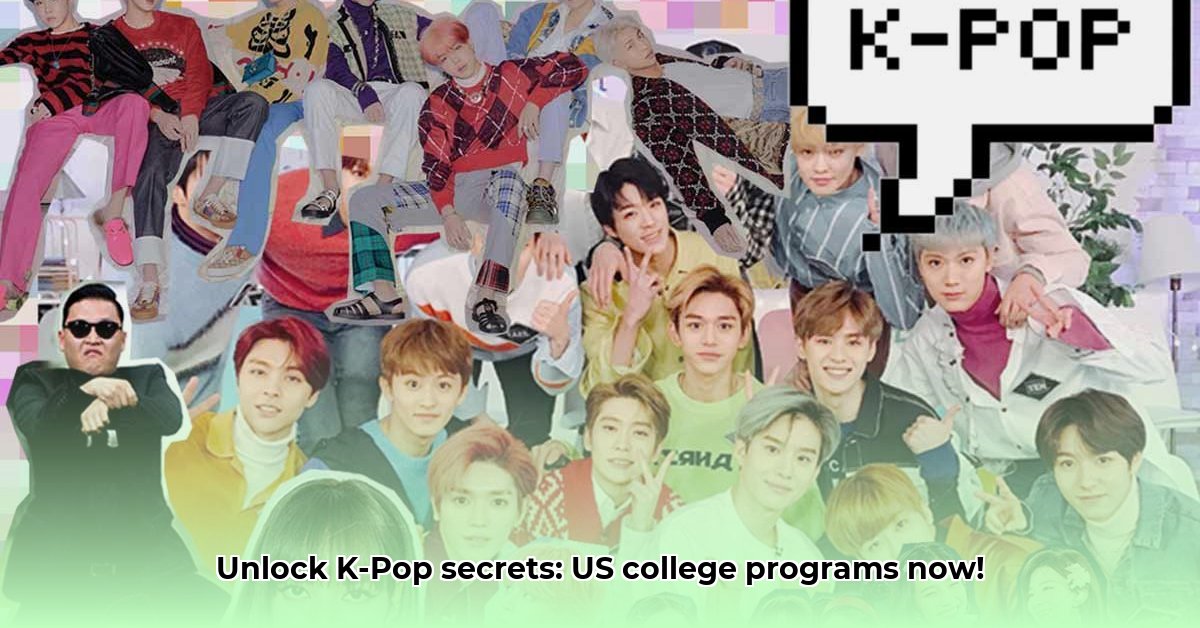Want to turn your K-Pop passion into a college degree? It’s happening! More and more US universities are offering courses and even whole programs focused on everything K-Pop. But with so many options popping up, it can be tough to figure out where to start. This guide cuts through the confusion, showing you the best K-Pop college courses, helping you choose the right program for you, and giving you the inside scoop on how to succeed and even launch a career in the exciting world of K-Pop after graduation. Whether you’re a future choreographer, manager, producer, or just want to deeply understand K-Pop’s cultural impact, we’ve got you covered. For aspiring idols, check out K-Pop idol training.
K-Pop University: US Programs Emerge
So, you’re dreaming of breaking into the exciting world of K-Pop? Maybe you envision yourself on stage, dazzling audiences with flawless choreography, or perhaps you’re more interested in the business side, crafting the next global hit. Whatever your K-Pop aspiration, you might be surprised to learn that US universities are starting to offer programs to help you achieve your dreams, providing structured pathways into this dynamic industry. Let’s dive into what this burgeoning field offers.
Understanding the K-Pop Education Landscape in the US
Forget the image of a single, dedicated “K-Pop University.” The reality is more exciting – and more diverse. K-Pop-related courses are popping up in colleges and universities across the US, integrated into various departments like music, dance, business, communications, or even East Asian cultural studies. This means you’ll find a wide range of options, not just one cookie-cutter approach.
Some programs concentrate on the nitty-gritty of K-Pop production: learning vocal techniques used by your favorite idols, mastering complex and synchronized dance routines, understanding music production software, or even dissecting the viral marketing strategies that propel songs to global fame. Others take a broader approach, exploring the cultural context of K-Pop’s global impact. These courses might delve into the history of the genre, analyze K-Pop’s influence on fashion, social media trends, and digital content creation, or even examine its political and economic dimensions within South Korea and beyond. You might even find programs that blend these practical and academic approaches, giving you a well-rounded understanding of the industry. It’s not just singing and dancing; it’s a holistic exploration of a global phenomenon, but what are the key factors, and where can you find these courses?
Challenges and Opportunities for Aspiring K-Pop Professionals
While the growth of K-Pop courses in US universities is fantastic news for aspiring K-Pop stars, producers, and scholars, there are also some challenges to consider. One significant challenge is the lack of standardization across programs. The curriculum, faculty expertise, and available resources can vary significantly from one institution to another. What you learn in a K-Pop course at one university might be completely different from what’s offered elsewhere. This lack of consistency can make it difficult for prospective students to compare programs effectively and determine which one best aligns with their specific goals and career aspirations.
Another issue is the relatively limited number of dedicated K-Pop degree programs. Many current offerings are individual courses, concentrations, or minors within larger degree programs. This can sometimes make it difficult to build a cohesive educational pathway towards a specialized career in the K-Pop industry. While this is rapidly evolving, students should be aware of this current limitation and conduct thorough research.
Despite these challenges, the emergence of K-Pop education in the US presents unique opportunities. Students have the chance to combine their passion for K-Pop with other academic disciplines, creating innovative career paths. For example, a student could combine K-Pop studies with business to pursue a career in entertainment management, or combine it with communications to work in K-Pop public relations and social media marketing.
Finding Your Perfect K-Pop Fit: A Step-by-Step Guide
Choosing a K-Pop related course or program requires careful planning and informed decision-making. Here’s how to approach your search:
- Define Your K-Pop Dream. What specifically draws you to the K-Pop world? Are you aiming for a career in performance, music production, choreography, entertainment law, management, marketing, journalism, or perhaps academic research? Identifying your goals is crucial for finding the right program.
- Research Extensively. Start researching universities and colleges that offer K-Pop courses or related programs. Don’t stop at the course title; dig deeper. Examine the course syllabus, faculty profiles, teaching methodologies, and available resources. What kind of practical experience will you gain? Look for student testimonials or program reviews to gain insights into the overall learning experience.
- Seek Hands-On Experience and Industry Connections. Look for programs that offer opportunities like internships at entertainment agencies, guest lectures by K-Pop industry professionals, student collaborations on music or video projects, or study abroad programs in South Korea. These experiences will give you a significant advantage after graduation.
- Understand Credit Transfer and Accreditation. Are the courses you’re interested in part of a degree program, or are they standalone? Does the credit transfer to your overall degree requirements? Understand how these courses fit into your broader educational plan and ensure that the program is accredited.
- Network and Connect. Attend K-Pop industry events, conferences, and workshops. Connect with professionals and students already working in the field. Networking can open doors to internships, mentorships, and even job opportunities. Online platforms and social media groups can also be valuable resources for connecting with like-minded individuals.
- Assess the Program’s Focus: Does the program prioritize performance skills, music production, cultural analysis, or business acumen? Ensure that the program’s strengths align with your interests and career aspirations.
- Consider Location: Some universities are located closer to major entertainment hubs, such as Los Angeles or New York, which may offer more internship and networking opportunities.
The Future of K-Pop Education: A Growing and Evolving Field
Many believe that the current state of K-Pop education is merely the beginning. There’s a growing need for more structured, standardized, and comprehensive programs. The ideal scenario involves more in-depth curricula, dedicated K-Pop studies departments at universities, and stronger, more formalized partnerships between universities and the K-Pop industry itself. We may also likely see the emergence of more interdisciplinary degree programs, allowing students to combine their love of K-Pop with other fields like business administration, digital marketing, international relations, or Korean language and culture. Is collaboration the key to future success?
The future likely involves a close collaboration between universities, industry professionals, and students to create a robust educational ecosystem that reflects the dynamism, innovation, and complexity of the K-Pop industry. This will ensure that future generations of K-Pop enthusiasts have clear pathways to pursue their passions and contribute to this exciting global phenomenon.
Weighing the Pros and Cons of Current K-Pop Course Offerings:
| Pros | Cons |
|---|---|
| Increasing availability of K-Pop related courses across the US | Significant variation in course quality, content, and faculty expertise |
| Diverse teaching methods and approaches catering to various interests | Inconsistent course structure, credit availability, and transferability |
| Strong student interest and demand for K-Pop education | Often limited direct career pathways or job placement assistance after graduation |
| Opportunities for practical hands-on learning and creative projects | Need for enhanced curriculum development, updated resources, and industry-relevant technologies |
The landscape of K-Pop education in the US is dynamic and rapidly changing. While challenges persist, the possibilities are exciting for anyone passionate about this global phenomenon. By carefully researching programs, networking with industry professionals, and remaining proactive in their learning, students can effectively navigate this evolving educational landscape and find the perfect starting point on their K-Pop journey.
How to Craft a Successful K-Pop Studies Curriculum
Key Takeaways:
- The increasing popularity of K-Pop has led to a surge in related college courses across the US, creating a demand for cohesive and comprehensive curricula.
- These courses vary widely in content and approach, highlighting a need for standardization and clearly defined learning objectives.
- A successful K-Pop curriculum should integrate theory with practice, incorporating experiential learning, industry collaboration, and critical analysis.
Mapping the K-Pop Educational Trajectory and Identifying Key Components
So, you want to unlock the secrets to creating a killer K-Pop studies curriculum? Let’s dive in. The current landscape is a vibrant mix of exciting opportunities and some serious inconsistencies. While universities like Skidmore College, San Diego State University, MIT, and others now offer K-Pop-related courses, the specific content, teaching methodologies, and program goals can differ significantly. Some programs concentrate on dance, others explore the business side, and still others focus on the socio-political and cultural context. This lack of cohesion presents both challenges and possibilities, but what are the critical building blocks for a successful and impactful K-Pop studies program?
Building Blocks of an Engaging and Comprehensive K-Pop Curriculum
What makes a K-Pop studies program truly stand out? It’s about creating a balanced, engaging, and comprehensive educational experience. We’re talking about more than just learning dance moves; it’s about understanding the cultural impact, the business strategies, the music production techniques, and the complex creative processes behind the phenomenon. Addressing ethical issues related to the industry is also crucial.
Here’s a potential framework:
- Core Foundational Courses: Foundational courses should provide students
- Discover Affordable Singing Lessons Near Me to Unlock Your Potential - February 24, 2026
- Affordable Vocal Lessons Bring Professional Singing Guidance Within Reach - February 23, 2026
- Local Vocal Lessons Offer Expert Guidance for Every Singer - February 22, 2026










